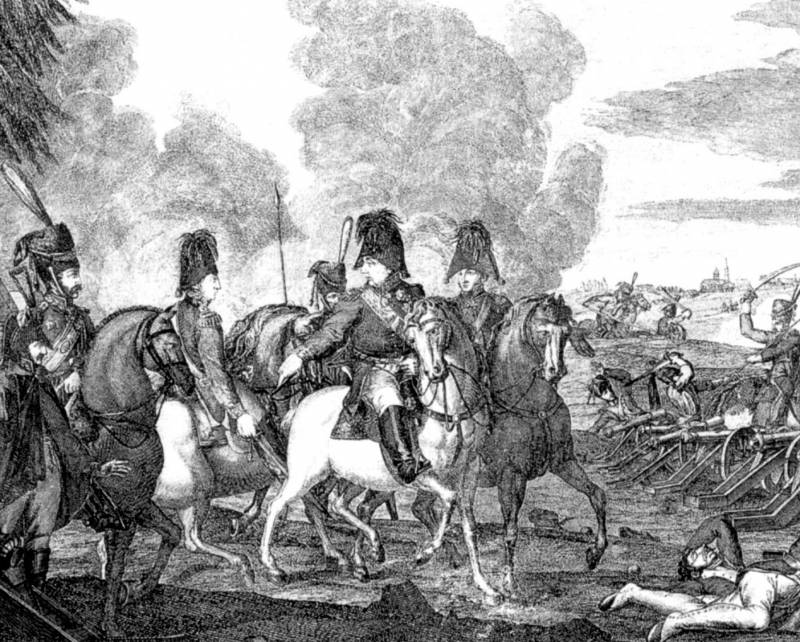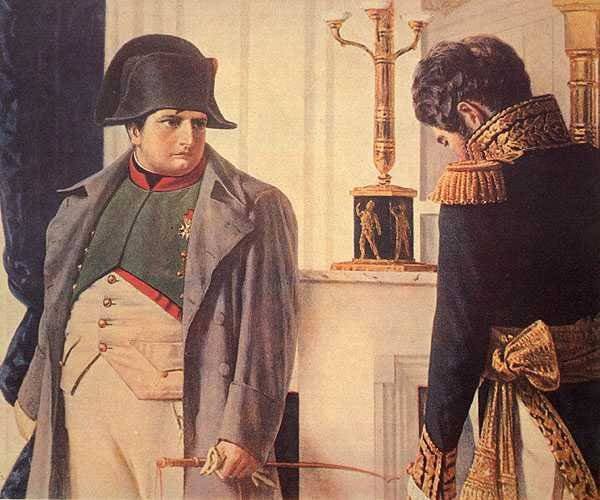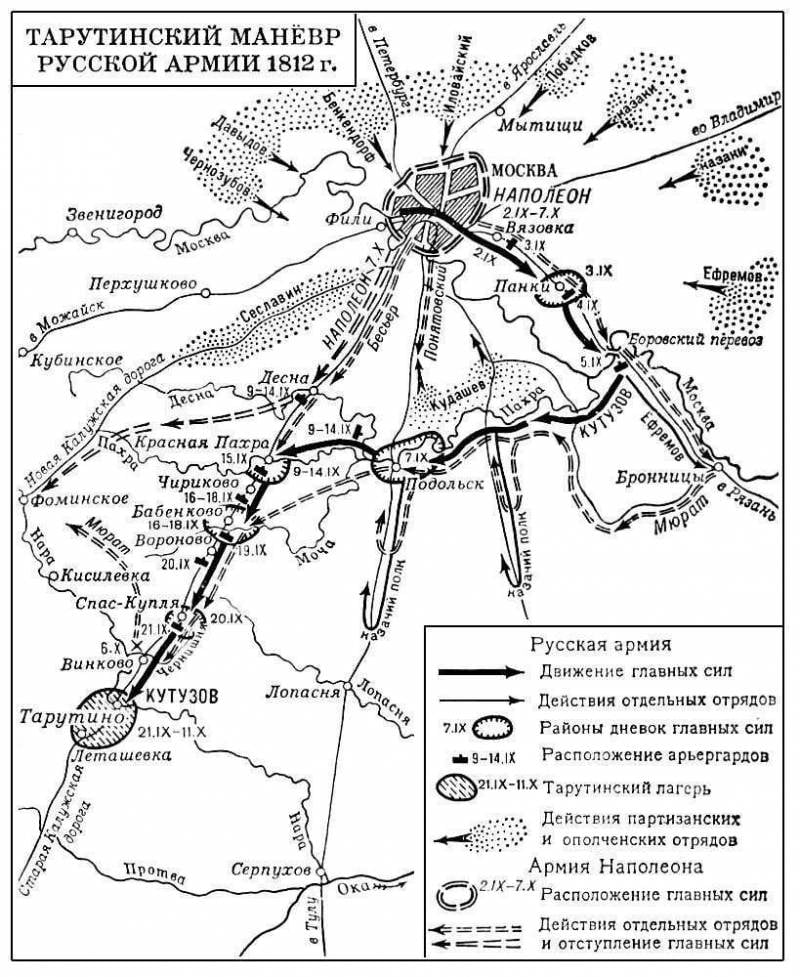How the French lost the Russian army

Victory at Tarutino on October 6 (18), 1812. Engraving by S. Fedorov after the original by D. Scott. 1814
Attempt to start peace negotiations
Having occupied Moscow (How the French captured Moscow), Napoleon was sure that the war would soon be over. He only had to dictate the terms of peace to the Russian Emperor Alexander Pavlovich. True, Moscow met the lord of Western Europe unkindly: the city was practically empty, the inhabitants left, and then burned down altogether (Moscow fire), depriving the French of the opportunity to stay in it for "winter apartments".
Also, the French were threatened by the Russian army under the command of Kutuzov, which, unlike the enemy, constantly grew and intensified. Also, the capital was surrounded by tens of thousands of partisans, Cossacks and fighters of people's self-defense units. Getting food and fodder in the vicinity of Moscow has become a big problem. The threat of losing communication between the main forces of the Great Army and the flank corps and the rear was growing. The French generals understood this well and demanded to leave Moscow.
Napoleon needed peace with Russia in order to strengthen the hegemon's position in Western Europe. Without waiting for the Russian ambassadors, Bonaparte himself began to take such steps. Through the director of the Orphanage, Major General Ivan Tutolmin, who sent a report to St. Petersburg, the conditions for a preliminary peace were transmitted: Russia's participation in the blockade of England and the restoration of an alliance with France.
There was no answer.
Then the French Emperor gave the letter to Alexander I through I. Yakovlev (Herzen's father). Offered to start peace talks immediately, otherwise
The Russian Tsar ignored this message as well.
September 22 (October 4) Napoleon sent Loriston to Kutuzov in Tarutino. The French emperor said to Lauriston:
On September 23 (October 5), a half-hour meeting between Loriston and Field Marshal Kutuzov took place. Then Prince Volkonsky was sent to the tsar with a report on Napoleon's proposal. However, this attempt ended in nothing.
Meanwhile, the position of the French army worsened every day. The soldiers in Moscow turned into robbers, marauders and drunkards. The army before our eyes turned into a crowd of flea marketers. The combat readiness of the corps and divisions sank sharply. Supply could not be established. Napoleon makes the difficult decision to leave Moscow.

V. Vereshchagin. Napoleon and Marshal Lauriston. Peace by all means
The Russian Army
At the council in Fili on September 1 (13), 1812, Bennigsen and Tol proposed to withdraw along the Kaluga road without entering Moscow. Barclay de Tolly believed that it was necessary to retreat towards Vladimir or Nizhny Novgorod, then move on to Tver in order to cover the capital. Kutuzov did not express his opinion, that he agreed that it was necessary to go towards Ryazan.
Russian troops marched from Moscow through the Ryazan outpost, then marched in two columns along the Ryazan road. The first overnight stay was made in the village of Panki on September 3 (15), 1812. A part of the convoy was sent along the Nizhny Novgorod road under the cover of the Winzingerode detachment. Then the Winzingerode detachment was to move to the Petersburg road. On the evening of September 3, the troops were instructed to go to the Borovskoye crossing across the river. Moscow, cross the river and set up camp. The convoy under the cover of the Cossacks went further, to Bronnitsy. And the troops turned west to Podolsk.
On September 6 (18), the Russian army reached Podolsk. Kutuzov decided to lead the troops further, to Krasnaya Pakhra. The Russian rearguard was stationed at Borovsky Perevoz until September 7 (19), and at night quickly withdrew to the main forces. The French did not notice this and continued to follow our cavalry to Bronnitsa. Having placed a cover on the Kolomna road, the Russian army on September 8 (20) retreated to Krasnaya Pakhra, where they camped until September 15 (27). Miloradovich's vanguard stood on the Desna River, covering the army from Moscow. The avant-garde of Raevsky stood as a barrier from Podolsk.
Kutuzov considered that it was necessary to withdraw the troops even further to Tarutino. This position is close to both Borovsk and Maloyaroslavets, and allowed to control the Old Kaluga, Tula and Ryazan roads. Bennigsen and Barclay opposed this decision. Barclay believed that a good position at Krasnaya Pakhra allowed him to accept the battle. Bennigsen proposed to launch an offensive and break the advanced enemy forces. Kutuzov rejected these proposals and gave the order to withdraw. On September 21 (October 3), the Russian army camped near the village of Tarutina, 80 km from Moscow.
Thus, the Russian army made the Tarutinsky maneuver, seizing the initiative in their own hands. Our troops broke away from the enemy, got the opportunity to rest, replenish their ranks and arm themselves. Communication was provided with reserves and supply bases in Kaluga, Tula and Bryansk. At the same time, the army covered the supply bases from the enemy. Communication with the southern armies of Tormasov and Chichagov was also maintained.
In addition, having a strong Russian army in the rear, Napoleon could not launch an attack on St. Petersburg. Bonaparte called the maneuver a move that put the French army in a difficult and even terrible position.

The French lose and find the Russian army
Kutuzov covered the retreat of the army with a curtain of cavalry and Cossacks. The French did not know where the Russian corps had gone. The French avant-garde of Claperade took the movement of two cavalry regiments along the Vladimir road for the withdrawal of the enemy army and followed them. By September 5 (17), the French had almost reached Pokrov. Sebastiani's cavalry followed the Cossacks along the Ryazan road almost to Bronnitsy in the same way. The Russian cavalry deceived the enemy and then slipped away. Marshal Murat was forced on September 9 (21) to report to Napoleon that the Russian army was lost.
The French began to suspect that the Russians were preparing a counterattack. Napoleon ordered to find the Russians at all costs. Delson's division was sent north, to Dmitrov, Ney's 3rd Corps - to the east, to Bogorodsk, Davout's 1st Corps - to the south, in the Moscow region. Murat, Poniatowski and Bessieres searched for Russian troops south of Moscow for five days. Only on September 14 (26) did the French stumble upon the Russians near Podolsk.
says General Claparede.
Information